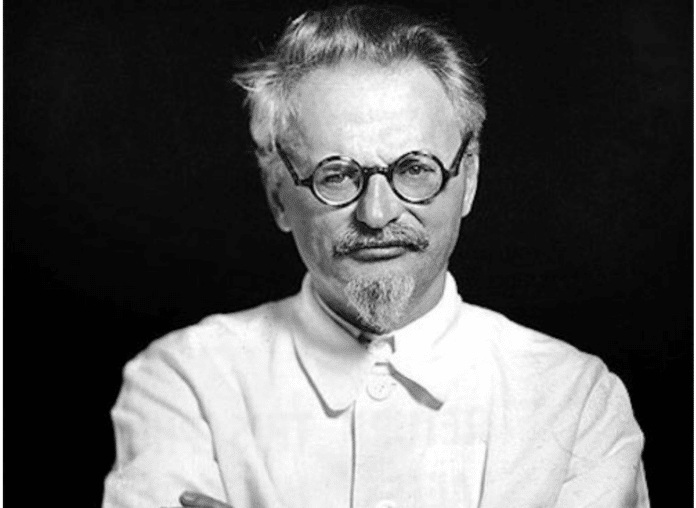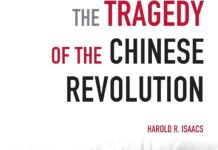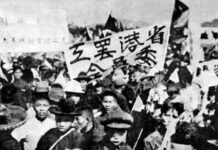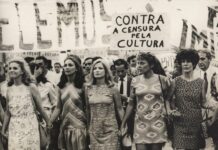The ideas of Leon Trotsky, and Trotskyism, have been much maligned and distorted through history. But who was Leon Trotsky, what is Trotskyism, and what is the relevance for the struggles we face today in the 2020s?
Paul Hunt, Socialist Alternative (ISA in England, Wales and Scotland)
The ideas of Leon Trotsky, and Trotskyism, have been much maligned and distorted through history. But who was Leon Trotsky, what is Trotskyism, and what is the relevance for the struggles we face today in the 2020s?
Who was Trotsky?
Winston Churchill, the racist leader of British imperialism once stated: “I hate Trotsky! It’s a very good thing that Stalin has got even with him.” Stalin for his part raged: “Trotskyism has transformed into a frenzied and unprincipled band of wreckers, diversionists, spies, and killers.”
In these two quotes we can see the visceral hatred expressed towards Trotsky and the ideas he fought for: revolutionary socialism, internationalism and workers’ democracy. He was hated and feared by the imperialists and Stalinists alike.
Trotsky’s life
Born in 1879, from a young age he played a leading role in the working class movement. This article details the monumental event of the Russian Revolution, led by the Bolsheviks with Lenin and Trotsky playing a pivotal role.
Following the victory of the workers and oppressed, 21 armies of imperialism attempted to snuff out the young workers’ state. Trotsky created the Red Army from scratch, which was ultimately able to beat back attempts to destroy the revolution.
The revolution survived, but following the defeats of revolutionary movements in Europe, particularly in Germany, it remained isolated. In this situation a bureaucracy developed headed by Stalin. Despite the internationalist outlook of the 1917 revolution and the Bolshevik leaders, the Stalinists came up with the theory of ‘socialism in one country’ which in effect gave up on the idea of world revolution, contrary to the aims of the Bolsheviks and Lenin.
River of blood
Enemies of the revolution and of socialism in general like to see Stalinism as a logical result of socialism and claim that any revolutionary movement will end in bureaucracy and dictatorship, that the seeds of this degeneration were to be found in Bolshevism. Nothing could be further from the truth. Lenin himself proposed a bloc with Trotsky against Stalin whilst on his deathbed to defend the ideals of the revolution.
In effect, Stalin and the bureaucracy had to launch a civil war against the ideas of the October Revolution, a war against internationalism and workers’ democracy, which also went hand in hand with the eventual rolling back of the social gains of the revolution.
Trotsky, alongside many others, formed the Left Opposition to fight back. As the Stalinist counter revolution gathered pace, Trotsky was expelled from the Communist Party and exiled. Tens of thousands of Left Oppositionists were sent to camps in Siberia where they were imprisoned and tortured. Despite horrendous state repression, they kept the flame of Marxism alive against the lies and distortions of the Stalinists, producing the Bulletin of the Opposition, that was clandestinely distributed.
Trotsky wrote in his 1937 classic The Revolution Betrayed:
“The fall of the present bureaucratic dictatorship, if it were not replaced by a new socialist power, would thus mean a return to capitalist relations with a catastrophic decline of industry and culture“.
This is what transpired with the collapse of the USSR. The analysis developed by Trotsky helped explain what was taking place, whilst guiding revolutionaries about the tasks facing workers in the Soviet Union.
Fighting fascism
Trotsky’s writings on how to fight fascism in the 1930s remain highly relevant. The Communist Parties at the time veered between the idea of ‘social fascism’ (where the leaders of the mass social democratic parties were said to be worse than fascists) and that of the Popular Front — that working class organisations should ally with a supposedly ‘progressive’ section of the capitalist class to stop fascism.
The results of these mistaken policies meant tragedy and defeat for the Spanish revolution and the victory of Franco, and in Germany where the Communists and Social Democrats helped pave the way for Hitler. Trotsky advocated a united front of workers’ organisations in Germany to smash the forces of fascism, but this was ignored by the leaders of the Communist Party with terrible results.
Permanent revolution
His development of the theory of permanent revolution, against the orthodoxy of most Marxists in the early 20th century, was proved correct by the events of the Russian revolution, showing what a dynamic and original thinker he was, and it is highly relevant now.
Trotsky argued that the capitalist class in Russia was too weak and too tied to foreign capital to play the kind historical role as it had in countries like France and Britain, in getting rid of feudalism and establishing a capitalist nation state. Therefore it fell to the working class to play the leading role in not only throwing off the shackles of feudal oppression but going forward to the tasks of the socialist revolution to guarantee democratic and national rights.
The theory of the permanent revolution is a guide today in the neo — colonial world where capitalism has proved incapable of guaranteeing basic democratic rights and freedoms.
Trotskyism today
Trotsky was eventually assassinated by a Stalinist agent in Mexico, 1940. However he and his supporters had ensured the continuity of revolutionary socialism and internationalism. US Socialist James P Cannon described Trotskyism as “not a new movement, a new doctrine, but the restoration, the revival, of genuine Marxism.”
Trotsky’s internationalism was not abstract, but flowed from his understanding of the need to defeat capitalism on a global scale. He played a key role in the decision of the Bolsheviks to form the Third (Communist) International in 1919 and after the degeneration of that organisation he fought for the setting up of the Fourth International in 1938. The fledgling Fourth International could not survive the impact of WW2. Many of its leading members were killed, and it did not have the political experience to be able to withstand the complicated situation following the war and it subsequently degenerated.
International Socialist Alternative
ISA traces its roots back to the Bolshevik revolution, the fight of Trotsky against Stalinism and the need for international socialist change. Our forerunners began the process of rebuilding a world party of socialist revolution, one that we continue today in over 30 countries because the global crisis of capitalism and the nature of the system makes it necessary. We are building ISA into a force that can decisively change the course of history and the ideas of Trotskyism will be central to that. We urge all readers to join us in this important task.




